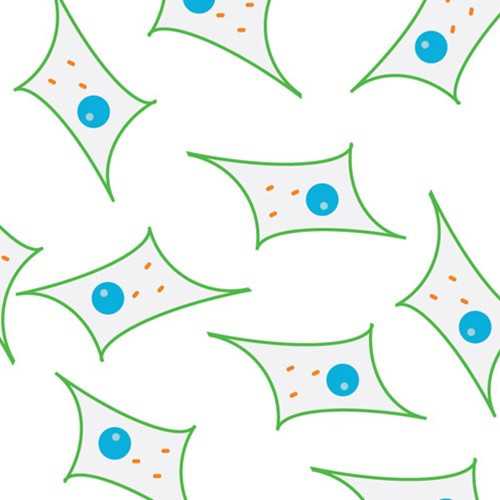Canine Hemangiosarcoma Cell Line (EFS)
EFS is a canine hemangiosarcoma cell line derived from a tumor in the spleen of a 9-year old spayed female Golden Retriever.
Hemangiosarcoma is a rapidly growing, highly invasive variety of cancer, occurring commonly in dogs. It is a sarcoma arising from the lining of blood vessels. A frequent cause of death is the rupturing of this tumor, causing the patient to rapidly bleed to death.
From the laboratory of Jaime F. Modiano, VMD, PhD, University Minnesota, Twin Cities.
EFS is a canine hemangiosarcoma cell line derived from a tumor in the spleen of a 9-year old spayed female Golden Retriever.
Hemangiosarcoma is a rapidly growing, highly invasive variety of cancer, occurring commonly in dogs. It is a sarcoma arising from the lining of blood vessels. A frequent cause of death is the rupturing of this tumor, causing the patient to rapidly bleed to death.
From the laboratory of Jaime F. Modiano, VMD, PhD, University Minnesota, Twin Cities.
This product is for sale to Nonprofit customers only. For profit customers, please Contact Us for more information.
Specifications
| Product Type: | Cell Line |
| Name: | EFS (Emma-spleen) |
| Cell Type: | Hemangiosarcoma |
| Accession ID: | CVCL_5I29 |
| Morphology: | Spindle |
| Source: | Spleen, Derived from paired metastatic lesion with cell line EFB that share common markers with the affected dog's constitutional germline DNA. IDEXX Bioresearch authentication ID IBR-36349-17-1 |
| Organism: | Dog |
| Biosafety Level: | 2 |
| Growth Conditions: | Ham's F12, 10% FBS, 0.05mg/ml ECGS, 0.01mg/ml heparin, 10mM HEPES Buffer, 100ug/ml Primocin |
| Subculturing: | Split 1:2-1:3 when cells reach ~80% confluence |
| Cryopreservation: | 90%FBS/10% DMSO |
| Mycoplasma Tested: | Yes |
| Storage: | Liquid nitrogen |
| Shipped: | Dry ice |
Provider
From the laboratory of Jaime F. Modiano, VMD, PhD, University Minnesota, Twin Cities.
References
- Gorden BH, Kim JH, Sarver AL, Frantz AM, Breen M, Lindblad-Toh K, O'Brien TD, Sharkey LC, Modiano JF, Dickerson EB. Identification of three molecular and functional subtypes in canine hemangiosarcoma through gene expression profiling and progenitor cell characterization. Am J Pathol. 2014 Apr;184(4):985-95. doi: 10.1016/j.ajpath.2013.12.025. Epub 2014 Feb 11.
- Lin W, Modiano JF, Ito D. Stage-specific embryonic antigen: determining expression in canine glioblastoma, melanoma, and mammary cancer cells. J Vet Sci. 2017 Mar 30;18(1):101-104. doi: 10.4142/jvs.2017.18.1.101. PubMed PMID: 27456773; PubMed Central PMCID: PMC5366293.
If you publish research with this product, please let us know so we can cite your paper.


